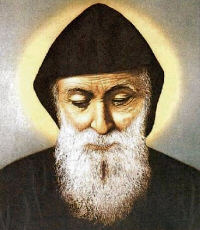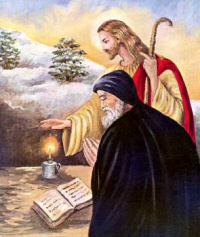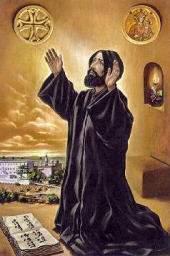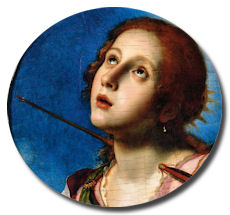
Daily Readings for:July 24, 2014
(Readings on USCCB website)
Collect: O God, who called the Priest Saint Sharbel Makhluf to the solitary combat of the desert and imbued him with all manner of devotion, grant us, we pray, that, being made imitators of the Lord's Passion, we may merit to be co-heirs of his Kingdom. Who lives and reigns with you in the unity of the Holy Spirit, one God, for ever and ever.
RECIPES
o Lebanese Potato and Beef Stew With a Side of Rice
ACTIVITIES
o Home Equipment for Junior Grade Artists
PRAYERS
· Ordinary Time: July 24th
· Optional Memorial of St. Sharbel (Charbel) Makhloof, priest
Old Calendar: St. Christina, virgin and martyr
St. Sharbel was a Lebanese monk, born in a small mountain village and ordained in 1858. Devoted to the Blessed Virgin Mary, he spent the last twenty-three years of his life as a hermit. Despite temptations to wealth and comfort, Saint Sharbel taught the value of poverty, self-sacrifice and prayer by the way he lived his life. This optional memorial is new to the USA liturgical calendar and was inscribed on July 24, 2004.
According to the 1962 Missal of St. John XXIII the Extraordinary Form of the Roman Rite, today is the feast of St. Christina who was martyred at Bolsena in Italy, probably under Diocletian (c. 307). She has been greatly venerated since at least the 6th century.
St. Sharbel (Charbel) Makhloof
Joseph Makhlouf was born in 1828 at Beqa-Kafra, Lebanon. His peasant family lived a strong faith, were attentive to the Divine Liturgy, and had a great devotion to the Mother of God.
At the age of 23, Charbel (the name he chose when entering Novitiate) left his closely knit family to enter the Lebanese-Maronite Monastery called Notre-Dame de Mayfouk. Following studies and profession at St. Cyprian de Kfifane Monastery, he was ordained in 1859.
For the next seven years, Charbel lived in the mountainous community of Anaya. After that he spent the next twenty-three years in complete solitude at Sts. Peter and Paul Hermitage near Anaya. He died there on Christmas Eve, 1898.
Charbel had a reputation for his austerity, penances, obedience, and chastity. At times, Charbel was gifted with levitations during prayer, and he had great devotion to the Most Blessed Sacrament.
In all things, Charbel maintained perfect serenity. He was beatified in 1965 by Pope Paul VI and canonized by Pope John Paul II in 1977.
On May 8, 1828 in a mountain village of Beka'kafra, the highest village in the near-east, Charbel was born to a poor Maronite family. From childhood his life revealed a calling to "bear fruit as a noble Cedar of Lebanon". Charbel "grew in age and wisdom before God and men." At 23 years old he entered the monastery of Our Lady of Mayfouk (north of Byblos) where he became a novice. After two years of novitiate, in 1853, he was sent to St. Maron monastery where he pronounced the monastic vows of poverty, chastity and obedience. Charbel was then transferred to the monastery of Kfeifan where he studied philosophy and theology. His ordination to the priesthood took place in 1859, after which he was sent back to St. Maron monastery. His teachers provided him with good education and nurtured within him a deep love for monastic life.
During his 19 years at St. Maron monastery, Charbel performed his priestly ministry and his monastic duties in an edifying way. He totally dedicated himself to Christ with undivided heart to live in silence before Nameless One. In 1875 Charbel was granted permission to live as a hermit nearby the monastery at St. Peter and Paul hermitage. His 23 years of solitary life were lived in a spirit of total abandonment to God.

Charbel's companions in the hermitage were the Sons of God, as encountered in the Scriptures and in the Eucharist, and the Blessed Mother. The Eucharist became the center of his life. He consumed the Bread of his Life and was consumed by it. Though this hermit did not have a place in the world, the world had a great place in his heart. Through prayer and penance he offered himself as a sacrifice so that the world would return to God. It is in this light that one sees the importance of the following Eucharistic prayer in his life:
"Father of Truth, behold Your Son a sacrifice pleasing to You, accept this offering of Him who died for me..."
On December 16, 1898 while reciting the "Father of Truth" prayer at the Holy Liturgy Charbel suffered a stroke. He died on Christmas Eve at the age of 70. Through faith this hermit received the Word of God and through love he continued the Ministry of Incarnation.
On the evening of his funeral, his superior wrote: "Because of what he will do after his death, I need not talk about his behavior". A few months after his death a bright light was seen surrounding his tomb. The superiors opened it to find his body still intact. Since that day a blood-like liquid flows from his body. Experts and doctors are unable to give medical explanations for the incorruptibility and flexibility. In the years 1950 and 1952 his tomb was opened and his body still had the appearance of a living one.
The spirit of Charbel still lives in many people. His miracles include numerous healings of the body and of the spirit. Thomas Merton, the American Hermit, wrote in his journal: "Charbel lived as a hermit in Lebanon—he was a Maronite. He died. Everyone forgot about him. Fifty years later, his body was discovered incorrupt and in short time he worked over 600 miracles. He is my new companion. My road has taken a new turning. It seems to me that I have been asleep for 9 years—and before that I was dead."
At the closing of the Second Vatican Council, on December 5, 1965 Charbel was beatified by Pope Paul VI who said:
"...a hermit of the Lebanese mountain is inscribed in the number of the blessed...a new eminent member of monastic sanctity is enriching, by his example and his intercession, the entire Christian people... May he make us understand, in a world largely fascinated by wealth and comfort, the paramount value of poverty, penance, and asceticism, to liberate the soul in its ascent to God..."
On October 9, 1977 during the World Synod of Bishops, Pope Paul VI canonized Blessed Charbel among the ranks of the Saints.
Taken from Opus Libani
Things to Do:
- Make a virtual visit to Our Lady of Lebanon Shrine.
- Visit this site dedicated to St. Charbel and read another biography.
- Listen to an Arabic prayer for God's Mercy from the Great Paraklesis (Supplicatory Prayer) to the Most Holy Theotokos. Notice the frescoes in the video of the praying saints which are from an obscure ancient Byzantine church in Maad, Lebanon, named after St. Charbel the old.
- Learn more about the Maronites.
St. Christina of Bolsena
Saint Christina was the daughter of a rich and powerful magistrate named Urban. Her father, who was deep in the practices of paganism, had a number of golden idols. His young daughter broke them, then distributed the pieces among the poor. Infuriated by this act, Urban became the persecutor of his own daughter. He had her whipped with rods and thrown into a dungeon. Christina remained unshaken in her faith. Her tormentor brought her forth to have her body torn by iron hooks, then fastened to a rack beneath which a fire was kindled. But God watched over His servant and turned the flames back toward the onlookers, several of whom perished.
The torments to which this young girl was subjected would seem as difficult to devise as to imagine; but God was beside her at all times. After a heavy stone was attached to her neck, Saint Christina was thrown into the lake of Bolsena, but was rescued by an Angel and seen wearing a stole and walking on the water, accompanied by several Angels. Her father, hearing she was still alive, died suddenly amid atrocious sufferings. A new judge succeeded him, a cruel pagan experienced in persecuting the Christians. He tried to win her by reminding her of her nobility, suggesting she was in serious error. Her reply infuriated him: “Christ, whom you despise, will tear me out of your hands!” Then Saint Christina suffered the most inhuman torments. The second judge also was struck down by divine justice. A third one named Julian, succeeded him. “Magician!” he cried, “adore the gods, or I will put you to death!” She survived a raging furnace, after remaining in it for five days. Serpents and vipers thrown into her prison did not touch her, but killed the magician who had brought them there. She sent them away in the name of Christ, after restoring the unfortunate magician to life; he was converted and thanked the God of Christina and the Saint. Then her tongue was cut out.
The Saint prayed to be allowed to finish her course. When she was pierced with arrows, she gained the martyr’s crown at Tyro, a city which formerly stood on an island in the lake of Bolsena in Italy, but has since been swallowed up by the waters. Her relics are now at Palermo in Sicily. Her tomb was discovered in the 19th century at Bolsena, marked with an inscription dating from the 10th century.
Excerpted from Les Petits Bollandistes: Vies des Saints, by Msgr. Paul Guérin (Bloud et Barral: Paris, 1882), Vol. 9.